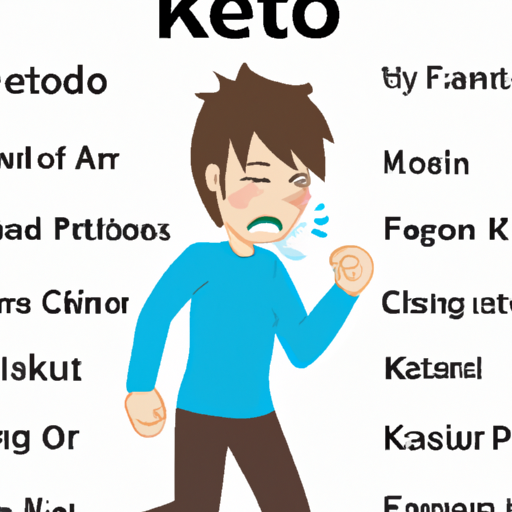This post may contain affiliate links which means I may receive a commission for purchases made through links. Learn more on my Private Policy page.
Symptom of Keto Flu
Introduction to Keto Flu
What is Keto Flu?
Keto flu is a collection of symptoms experienced by some people when they first start a ketogenic diet. The keto diet is a low-carb, high-fat diet designed to help the body enter a state of ketosis, where it burns fat for energy instead of carbohydra
tes. As the body adapts to this new fuel source, some individuals may experience flu-like symptoms, hence the name “keto flu.”
Causes of Keto Flu
The primary cause of keto flu is the body’s transition from burning glucose (sugar) to burning fat for energy. This metabolic shift can lead to dehydration and electrolyte imbalances, which can cause various symptoms. Additionally, the sudden reduction in carbohydrate intake can lead to a drop in insulin levels, further contributing to these symptoms.
Symptoms of Keto Flu
While not everyone on a ketogenic diet will experience keto flu, it is essential to be aware of the possible symptoms. Here are some common symptoms associated with keto flu:
Fatigue
One of the most common symptoms of keto flu is fatigue or a general lack of energy. This is because the body is adapting to using ketones for energy instead of glucose. As the body becomes more efficient at using ketones, energy levels should improve.
Headaches
Headaches can occur as the body adjusts to the decrease in carbohydrates and the resulting drop in blood sugar levels. Drinking plenty of water and replenishing electrolytes can help alleviate headache symptoms.
Nausea and Vomiting
Nausea and vomiting may occur as the body struggles to digest the increased fat intake. This can be managed by gradually increasing fat consumption, giving the body time to adapt.
Dizziness and Lightheadedness
Dizziness and lightheadedness are often caused by dehydration and electrolyte imbalances. Drinking plenty of water and consuming electrolytes can help mitigate these symptoms.
Irritability
Mood swings and irritability can occur as a result of fluctuating blood sugar levels and changes in the body’s energy sources. This symptom usually subsides as the body adapts to the new diet.
Muscle Cramps and Weakness
Muscle cramps and weakness can result from electrolyte imbalances, particularly low levels of potassium, magnesium, and sodium. Supplementing with these electrolytes can help alleviate these symptoms.
Difficulty Sleeping
Some individuals may experience difficulty sleeping during the initial stages of the keto diet. This may be due to changes in blood sugar levels or the body’s increased production of stress hormones, like cortisol, during the adaptation period. Establishing a regular sleep schedule and practicing relaxation techniques may help improve sleep quality.
Digestive Issues
Digestive issues, such as constipation or diarrhea, may occur as the body adjusts to the high-fat, low-carb diet. Drinking water, consuming fiber-rich low-carb vegetables, and gradually increasing fat intake can help alleviate these symptoms.
Brain Fog
Brain fog, or difficulty concentrating, can be a symptom of keto flu as the brain adjusts to using ketones for energy instead of glucose. This symptom should improve as the body becomes more efficient at utilizing ketones.
How to Deal with Keto Flu
While keto flu can be uncomfortable, there are several strategies to help manage symptoms and make the transition to a ketogenic diet smoother:
Stay Hydrated
Drinking enough water is crucial for maintaining proper hydration levels and preventing symptoms such as dizziness, lightheadedness, and headaches.
Replenish Electrolytes
Electrolytes, such as sodium, potassium, and magnesium, are essential for maintaining proper muscle function and preventing cramps. Consume electrolyte-rich foods, like avocados and leafy greens, or consider using electrolyte supplements.
Get Enough Rest
Ensure you get adequate sleep and allow your body time to recover and adapt to the new diet. Practice relaxation techniques to help improve sleep quality.
Gradual Carb Reduction
Instead of drastically cutting carbohydrates from your diet, consider reducing them gradually. This allows the body more time to adjust to the new fuel source and may reduce the severity of keto flu symptoms.
Conclusion
Keto flu is a common but temporary side effect experienced by some individuals when transitioning to a ketogenic diet. By recognizing the symptoms and implementing strategies to alleviate them, you can make the transition to a keto lifestyle smoother and more enjoyable.
FAQ
- Is keto flu dangerous?
Keto flu is generally not dangerous and is a temporary side effect as the body adjusts to a ketogenic diet. However, if symptoms become severe or persistent, it is essential to consult a healthcare professional.
- How long does keto flu last?
Keto flu typically lasts for a few days to a couple of weeks. The duration varies from person to person and depends on factors such as individual metabolism and adherence to the diet.
- Can I avoid keto flu?
While it is not possible to guarantee the avoidance of keto flu, implementing strategies such as gradual carb reduction, staying hydrated, and replenishing electrolytes can help minimize symptoms.
- Is it normal to feel weak during keto flu?
Yes, feeling weak is a common symptom of keto flu, resulting from the body’s adjustment to using fat for energy instead of glucose. This symptom should improve as the body becomes more efficient at utilizing ketones.
- Can I exercise during keto flu?
It is generally safe to exercise during keto flu, but it is essential to listen to your body and modify your workouts as needed. Light exercise, such as walking or yoga, may be more appropriate during this time.


